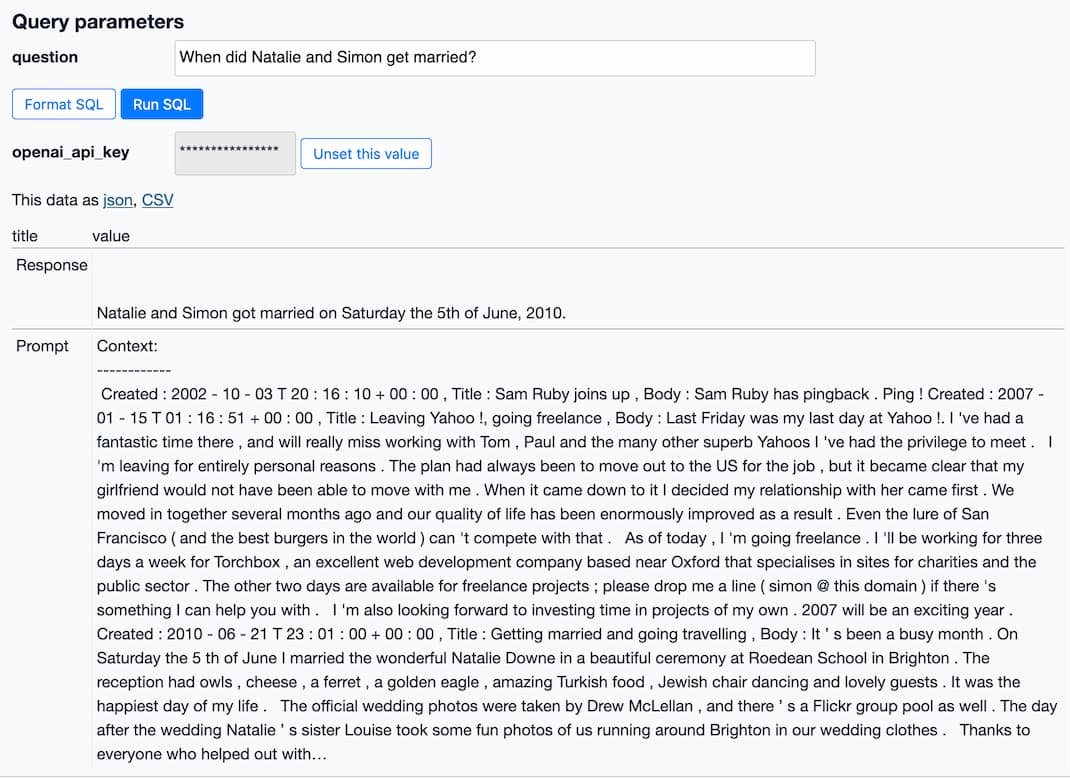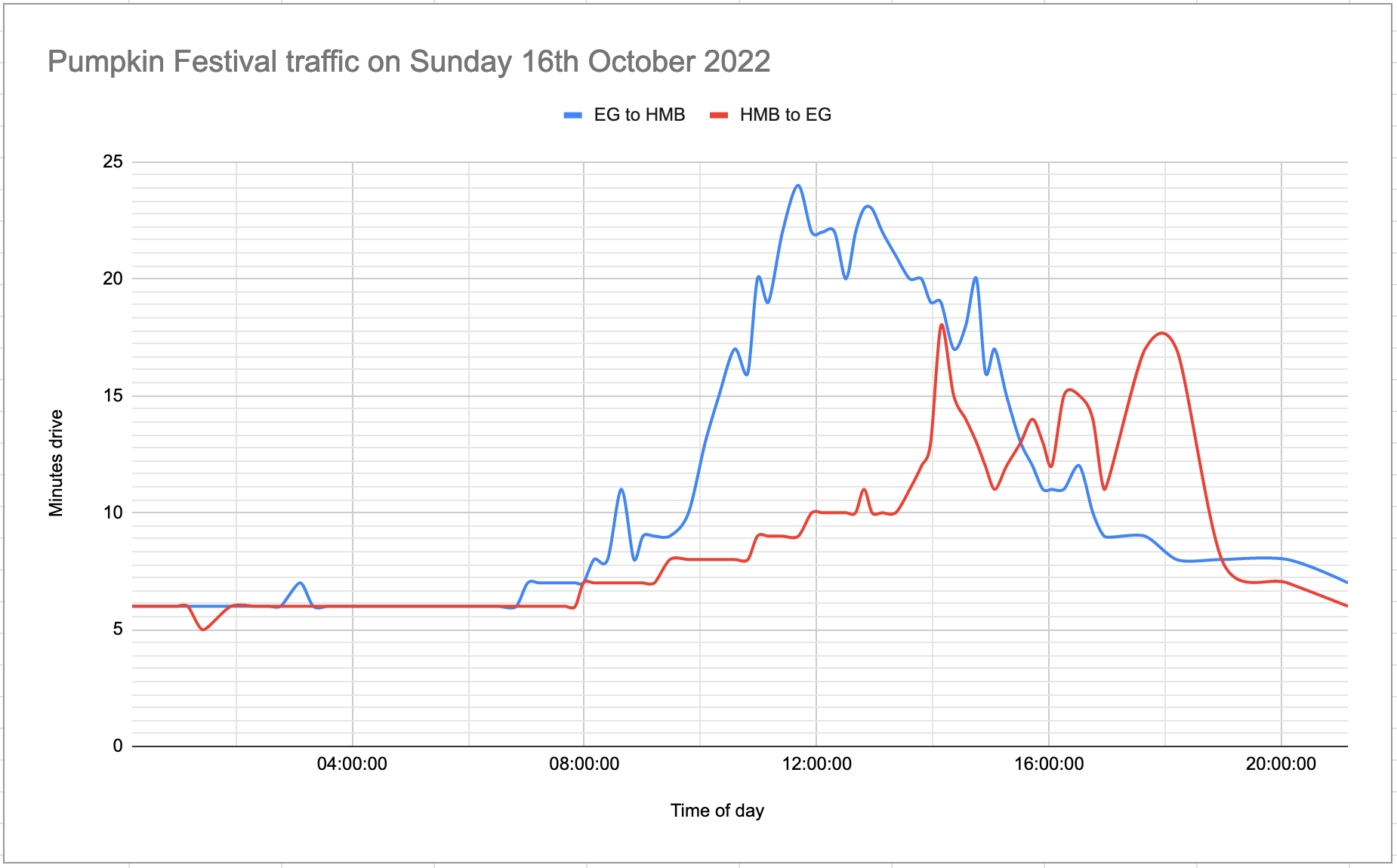313 posts tagged “sqlite”
SQLite is the world's most widely deployed database engine.
2023
sqlite-fastrand. Alex Garcia just dropped three new SQLite extensions, and I’m going to link to all of them. The first is sqlite-fastrand, which adds new functions for generating random numbers (and alphanumeric characters too). Impressively, these out-perform the default SQLite random() and randomblob() functions by about 1.6-2.6x, thanks to being built on the Rust fastrand crate which builds on wyhash, an extremely fast (though not cryptographically secure) hashing function.
[On SQLite for production concurrent writes] In general, WAL mode “just works” as Simon said. You just need to make sure you don’t have long running write transactions, although those are somewhat problematic in any database system. Don’t do stuff like starting a write txn and then calling a remote API and then committing. That’ll kill your write throughout.
Wildebeest (via) New project from Cloudflare, first quietly unveiled three weeks ago: “Wildebeest is an ActivityPub and Mastodon-compatible server”. It’s built using a flurry of Cloudflare-specific technology, including Workers, Pages and their SQLite-based D1 database.
Hctree Design Documentation. More detailed information on the design of the new Hctree SQLite branch.
Hctree: an experimental high-concurrency database backend for SQLite (via) Really interesting new research branch from the core SQLite team. “Hctree uses optimistic row-level locking and is designed to support dozens of concurrent writers running at full-speed”—with very impressive benchmarks supporting that claim. Also two bonuses: it has a replication mechanism based on the existing SQLite sessions extension, and it bumps up the maximum size of a SQLite database from 16TiB to 1EiB (roughly one million TiB).
Introducing sqlite-xsv: The Fastest CSV Parser for SQLite. Alex Garcia continues to push the boundaries of SQLite extensions. This new extension in Rust wraps the lightning fast Rust csv crate and provides a new csv_reader() virtual table that can handle regular, gzipped and zstd compressed files.
How to implement Q&A against your documentation with GPT3, embeddings and Datasette
If you’ve spent any time with GPT-3 or ChatGPT, you’ve likely thought about how useful it would be if you could point them at a specific, current collection of text or documentation and have it use that as part of its input for answering questions.
[... 3,447 words]2022
Introducing sqlite-loadable-rs: A framework for building SQLite Extensions in Rust. Alex Garcia has built a new Rust library for creating SQLite extensions—initially supporting custom scalar functions, virtual tables and table functions and with more types of extension coming soon. This looks very easy to use, partly because the documentation and examples are already delightfully thorough, especially for an initial release.
fasiha/yamanote (via) Yamanote is “a guerrilla bookmarking server” by Ahmed Fasih—it works using a bookmarklet that grabs a full serialized copy of the page—the innerHTML of both the head and body element—and passes it to the server, which stores it in a SQLite database. The files are then served with a Content-Security-Policy’: `default-src ’self’ header to prevent stored pages from fetching ANY external assets when they are viewed.
JSON Changelog with SQLite (via) One of my favourite database challenges is how to track changes to rows over time. This is a neat recipe from 2018 which uses SQLite triggers and the SQLite JSON functions to serialize older versions of the rows and store them in TEXT columns.
About the sqlite3 WASM/JS Subproject. SQLite now maintains an official WebAssembly build. It’s influenced by sql.js but is a fresh implementation with its own API design. It also supports Origin-Private FileSystem (OPFS)—a very new standard which doesn’t yet have wide browser support that allows websites to save and load files using a dedicated folder on the host machine.
Weeknotes: DjangoCon, SQLite in Django, datasette-gunicorn
I spent most of this week at DjangoCon in San Diego—my first outside-of-the-Bay-Area conference since the before-times.
[... 1,184 words]Measuring traffic during the Half Moon Bay Pumpkin Festival
This weekend was the 50th annual Half Moon Bay Pumpkin Festival.
[... 2,693 words]Stringing together several free tiers to host an application with zero cost using fly.io, Litestream and Cloudflare. Alexander Dahl provides a detailed description (and code) for his current preferred free hosting solution for small sites: SQLite (and a Go application) running on Fly’s free tier, with the database replicated up to Cloudflare’s R2 object storage (again on a free tier) by Litestream.
libsql (via) A brand new Apache 2 licensed fork of SQLite. The README explains the rationale behind the project: SQLite itself is open source but not open contribution, and this fork aims to try out new ideas. The most interesting to me so far is a plan to support user defined functions implemented in WebAssembly. The project also intends to use Rust for new feature development.
Introducing LiteFS (via) LiteFS is the new SQLite replication solution from Fly, now ready for beta testing. It’s from the same author as Litestream but has a very different architecture; LiteFS works by implementing a custom FUSE filesystem which spies on SQLite transactions being written to the journal file and forwards them on to other nodes in the cluster, providing full read-replication. The signature Litestream feature of streaming a backup to S3 should be coming within the next few months.
How I’m a Productive Programmer With a Memory of a Fruit Fly (via) Hynek Schlawack describes the value he gets from searchable offline developer documentation, and advocates for the Documentation Sets format which bundles docs, metadata and a SQLite search index. Hynek’s doc2dash command can convert documentation generated by tools like Sphinx into a docset that’s compatible with several offline documentation browser applications.
[SQLite is] a database that in full-stack culture has been relegated to "unit test database mock" for about 15 years that is (1) surprisingly capable as a SQL engine, (2) the simplest SQL database to get your head around and manage, and (3) can embed directly in literally every application stack, which is especially interesting in latency-sensitive and globally-distributed applications.
Reason (3) is clearly our ulterior motive here, so we're not disinterested: our model user deploys a full-stack app (Rails, Elixir, Express, whatever) in a bunch of regions around the world, hoping for sub-100ms responses for users in most places around the world. Even within a single data center, repeated queries to SQL servers can blow that budget. Running an in-process SQL server neatly addresses it.
APSW is now available on PyPI. News I missed from June: the venerable (17+ years old) APSW SQLite library for Python is now officially available on PyPI as a set of wheels, built using cibuildwheel. This is a really big deal: APSW is an extremely well maintained library which exposes way more low-level SQLite functionality than the standard library’s sqlite3 module, and to-date one of the only disadvantages of using it was the need to install it independently of PyPI. Now you can just run “pip install apsw”.
How the SQLite Virtual Machine Works. The latest entry in Ben Johnson’s series about SQLite internals.
CROSS JOIN and virtual tables in SQLite. Learned today on the SQLite forums that the SQLite CROSS JOIN in SQLite is a special case of join where the provided table order is preserved when executing the join. This is useful for advanced cases where you might want to use a SQLite virtual table to perform some kind of custom operation—searching against an external search engine for example—and then join the results back against other tables in a predictable way.
Discord History Tracker. Very interestingly shaped piece of software. You install and run a localhost web application on your own machine, then paste some JavaScript into the Discord Electron app’s DevTools console (ignoring the prominent messages there warning you not to paste anything into it). The JavaScript scrapes messages you can see in Discord and submits them back to that localhost application, which writes them to a SQLite database for you. It’s written in C# with ASP.NET Core, but complied executables are provided for Windows, macOS and Linux. I had to allow execution of four different unsigned binaries to get this working on my Mac.
Notes on the SQLite DuckDB paper
SQLite: Past, Present, and Future is a newly published paper authored by Kevin P. Gaffney, Martin Prammer and Jignesh M. Patel from the University of Wisconsin-Madison and D. Richard Hipp, Larry Brasfield and Dan Kennedy from the core SQLite engineering team.
[... 1,021 words]How SQLite Scales Read Concurrency (via) Ben Johnson’s series on SQLite internals continues—this time with a detailed explanation of how the SQLite WAL (Write-Ahead Log) is implemented.
Turning SQLite into a distributed database (via) Heyang Zhou introduces mvSQLite, his brand new open source “SQLite-compatible distributed database” built in Rust on top of Apple’s FoundationDB. This is a very promising looking new entry into the distributed/replicated SQLite space: FoundationDB was designed to provide low-level primitives that tools like this could build on top of.
sethmlarson/pypi-data (via) Seth Michael Larson uses GitHub releases to publish a ~325MB (gzipped to ~95MB) SQLite database on a roughly monthly basis that contains records of 370,000+ PyPI packages plus their OpenSSF score card metrics. It’s a really interesting dataset, but also a neat way of packaging and distributing data—the scripts Seth uses to generate the database file are included in the repository.
Introducing sqlite-http: A SQLite extension for making HTTP requests (via) Characteristically thoughtful SQLite extension from Alex, following his sqlite-html extension from a few days ago. sqlite-http lets you make HTTP requests from SQLite—both as a SQL function that returns a string, and as a table-valued SQL function that lets you independently access the body, headers and even the timing data for the request.
This write-up is excellent: it provides interactive demos but also shows how additional SQLite extensions such as the new-to-me “define” extension can be combined with sqlite-http to create custom functions for parsing and processing HTML.
How SQLite Helps You Do ACID (via) Ben Johnson’s series of posts explaining the internals of SQLite continues with a deep look at how the rollback journal works. I’m learning SO much from this series.
sqlite-zstd: Transparent dictionary-based row-level compression for SQLite. Interesting SQLite extension from phiresky, the author of that amazing SQLite WASM hack from a while ago which could fetch subsets of a large SQLite database using the HTTP range header. This extension, written in Rust, implements row-level compression for a SQLite table by creating compression dictionaries for larger chunks of the table, providing better results than just running compression against each row value individually.
Introducing sqlite-html: query, parse, and generate HTML in SQLite (via) Another brilliant SQLite extension module from Alex Garcia, this time written in Go. sqlite-html adds a whole family of functions to SQLite for parsing and constructing HTML strings, built on the Go goquery and cascadia libraries. Once again, Alex uses an Observable notebook to describe the new features, with embedded interactive examples that are backed by a Datasette instance running in Fly.

